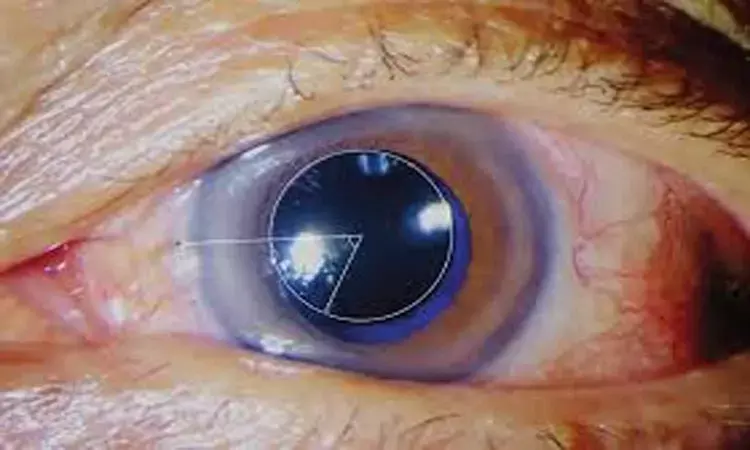- Home
- Medical news & Guidelines
- Anesthesiology
- Cardiology and CTVS
- Critical Care
- Dentistry
- Dermatology
- Diabetes and Endocrinology
- ENT
- Gastroenterology
- Medicine
- Nephrology
- Neurology
- Obstretics-Gynaecology
- Oncology
- Ophthalmology
- Orthopaedics
- Pediatrics-Neonatology
- Psychiatry
- Pulmonology
- Radiology
- Surgery
- Urology
- Laboratory Medicine
- Diet
- Nursing
- Paramedical
- Physiotherapy
- Health news
- Fact Check
- Bone Health Fact Check
- Brain Health Fact Check
- Cancer Related Fact Check
- Child Care Fact Check
- Dental and oral health fact check
- Diabetes and metabolic health fact check
- Diet and Nutrition Fact Check
- Eye and ENT Care Fact Check
- Fitness fact check
- Gut health fact check
- Heart health fact check
- Kidney health fact check
- Medical education fact check
- Men's health fact check
- Respiratory fact check
- Skin and hair care fact check
- Vaccine and Immunization fact check
- Women's health fact check
- AYUSH
- State News
- Andaman and Nicobar Islands
- Andhra Pradesh
- Arunachal Pradesh
- Assam
- Bihar
- Chandigarh
- Chattisgarh
- Dadra and Nagar Haveli
- Daman and Diu
- Delhi
- Goa
- Gujarat
- Haryana
- Himachal Pradesh
- Jammu & Kashmir
- Jharkhand
- Karnataka
- Kerala
- Ladakh
- Lakshadweep
- Madhya Pradesh
- Maharashtra
- Manipur
- Meghalaya
- Mizoram
- Nagaland
- Odisha
- Puducherry
- Punjab
- Rajasthan
- Sikkim
- Tamil Nadu
- Telangana
- Tripura
- Uttar Pradesh
- Uttrakhand
- West Bengal
- Medical Education
- Industry
New eye drops may prevent vision loss after retinal vein occlusion

NEW YORK, NY -- Researchers at Columbia University Irving Medical Center have developed eye drops that could prevent vision loss after retinal vein occlusion, a major cause of blindness for millions of adults worldwide.
A study, in mice, suggests that the experimental therapy -- which targets a common cause of neurodegeneration and vascular leakage in the eye -- could have broader therapeutic effects than existing drugs.
The study was published in Nature Communications.
What is Retinal Vein Occlusion?
Retinal vein occlusion occurs when a major vein that drains blood from the retina is blocked, usually due to a blood clot. As a result, blood and other fluids leak into the retina, damaging specialized light-sensing neurons called photoreceptors.
Standard treatment for the condition currently relies on drugs that reduce fluid leakage from blood vessels and abnormal blood vessel growth. But there are significant drawbacks. These therapies require repeated injections directly into the eye, and for the patients who brave this daunting prospect, the treatment ultimately fails to prevent vision loss in the majority of cases.
The new treatment targets an enzyme called caspase-9, says Carol M. Troy, MD, PhD, professor of pathology & cell biology and of neurology in the Taub Institute for Research on Alzheimer's Disease and the Aging Brain at Columbia University Vagelos College of Physicians and Surgeons, who led the studies. Under normal conditions, caspase-9 is believed to be primarily involved in programmed cell death, a tightly regulated mechanism for naturally eliminating damaged or excess cells.
However, in studies of mice, the Troy lab discovered that when blood vessels are injured by retinal vein occlusion, the caspase-9 becomes uncontrollably activated, triggering processes that can damage the retina.
Eye Drops Prevent Retinal Injury
The Troy lab found that a highly selective caspase-9 inhibitor, delivered in the form of eye drops, improved a variety of clinical measures of retinal function in a mouse model of the condition. Most importantly, the treatment reduced swelling, improved blood flow, and decreased neuronal damage in the retina.
"We believe these eye drops may offer several advantages over existing therapies," says Troy. "Patients could administer the drug themselves and wouldn't have to get a series of injections. Also, our eye drops target a different pathway of retinal injury and thus may help patients who do not respond to the current therapy."
Next Steps
The researchers are preparing to test the eye drops in people with retinal vein occlusion during a phase I clinical trial.
Moving forward, the Troy lab will also study whether caspase-9 inhibitors can be used to treat other vascular injuries caused by overactivation of the enzyme, including diabetic macular edema (another common cause of blindness) and stroke.
"Vascular dysfunction is at the heart of many chronic neurological and retinal disorders, because high energy demands in the brain and eye render these tissues exceptionally vulnerable to disruption in blood supply," says the study's first author, Maria Avrutsky, PhD, postdoctoral research scientist in pathology & cell biology at Columbia University Vagelos College of Physicians and Surgeons.
Hina Zahid Joined Medical Dialogue in 2017 with a passion to work as a Reporter. She coordinates with various national and international journals and association and covers all the stories related to Medical guidelines, Medical Journals, rare medical surgeries as well as all the updates in the medical field. Email: editorial@medicaldialogues.in. Contact no. 011-43720751
Dr Kamal Kant Kohli-MBBS, DTCD- a chest specialist with more than 30 years of practice and a flair for writing clinical articles, Dr Kamal Kant Kohli joined Medical Dialogues as a Chief Editor of Medical News. Besides writing articles, as an editor, he proofreads and verifies all the medical content published on Medical Dialogues including those coming from journals, studies,medical conferences,guidelines etc. Email: drkohli@medicaldialogues.in. Contact no. 011-43720751


